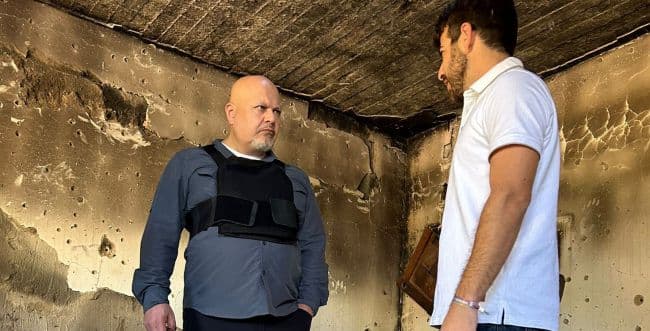"International Crimes"
Prosecutor of the Hague Tribunal: "These are Serious International Crimes"
The prosecutor of the court in the Hague who visited Israel, met with the families of the abductees and toured the areas of the massacre, in a statement published by a reporter: "these are the cases for which the international court was established."

The prosecutor of the International Court of Justice in The Hague, Karim Khan, visited Israel last week in the areas of the massacre in the Gaza Strip envelope settlements and met with the families of the abductees held captive by the terrorist organization Hamas.
In a statement issued today (Sunday), Khan wrote, "I witnessed scenes of calculated brutality. The attacks against innocent Israeli civilians on October 7 represent some of the most serious international crimes that shock the conscience of humanity, crimes that the Hague Tribunal was established to address. In my meeting with these attacks' victims' families, my message was clear: we are ready to work in partnership with them as part of our ongoing work to hold those responsible accountable."
"I called for the immediate and unconditional release of all hostages taken by Hamas and other terrorist organizations," Khan said. "There can be no justification for holding hostages, and especially for a blatant violation of basic principles of humanity by taking children and continuing to hold them. Hostages cannot be treated as human shields or bargaining chips."
"Regarding Gaza," Khan wrote, "despite ongoing violations of international humanitarian law by Hamas and other armed organizations in the Gaza Strip, the manner in which Israel responds to these attacks is subject to clear legal parameters that govern armed conflict. Conflict in densely populated areas, where it is alleged that fighters are illegally embedded in the civilian population it is complex by nature, but there is still international humanitarian law and the Israeli army knows the law that must be applied.
"As I mentioned before, Israel has trained lawyers who advise commanders and a robust system designed to ensure compliance with international humanitarian law. During this visit, I emphasized again that the clear legal principles of distinction, caution and proportionality must be met in order for the protection of the law to become meaningful for those who need it. I emphasized that there must be not only keeping of the law, but also to uphold the spirit. International humanitarian law and the provisions of the Rome Convention are designed to protect the most vulnerable."